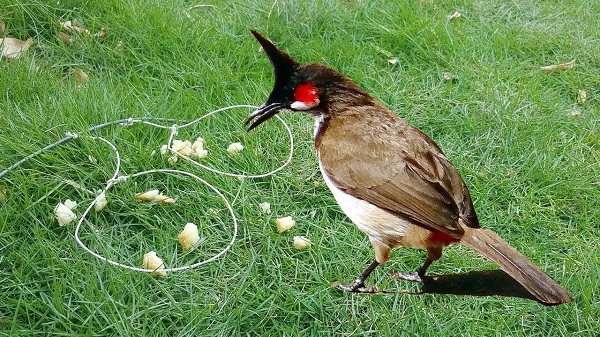FWP:
SETS == EK; MUSHAIRAH
In the first line, we learn that with every lament or groan, a piece of the heart 'comes'. This piece is described as ek paarah , and the ek means it could be either a small or unimportant one ('mere, only'), or one of some particular kind ('certain'), or else an unusual one ('unique, singular'), or else a very superior one ('preeminent, excellent'). Why does it 'come', or emerge, or whatever? We have to wait-- under mushairah performance conditions-- for the second line to tell us more.
But then the second line, as so often, starts afresh, giving the verse an 'A,B' structure. We learn that a hunt is in progress today: the 'string' or 'thread' of the breath has shaped itself into a 'noose' so that it can snare its prey. Not until the last possible moment, with the rhyme-word, do we learn what the hunt is for: that the prey is 'effect'.
So what is the connection between the two lines? One possible reading is that the 'noose' of the breath is so powerful a hunter that it readily ensnares its prey: every time the lover breathes out a groan or lament, the 'noose' of his own breath, as part of its 'effect', captures and drags out a piece of his heart at the same time. The lover's very life-breath is in pursuit of his life and is a mortal enemy to his heart's wellbeing; thus the lover's wretchedness is made manifest, and he is brought closer to the death that will end his sorrows.
Another possible reading is that the 'hunt' involves the use not only of snares, but also of bait. Just as bird-catchers use bait to lure their prey into the net or snare, so the breath is baiting its snares with alluringly fresh pieces of the heart; a big hunt is going on today, and the best resources and most cunning tricks are being mobilized.
One more possible reading is an ironic one: when the lover
mounts a major 'hunt' for 'effect', his best achievement, the only proof of
his prowess, is that he increases the sufferings of his own heart. As for
his laments and groans having any 'effect' on the stony heart of the beloved
herself-- well, the question apparently doesn't even arise.

Nazm:
That is, the sorrowful sigh has, like a noose, made 'effect' its prey. Whenever anyone sighs, a burden is removed from the heart. That is, from the effect of the sigh, the heart breaks into fragments and is drawn out along with the sigh. (49-50)
== Nazm page 49